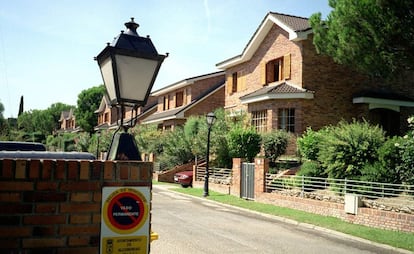Zipcode check: Which are Spain’s richest and poorest areas?
If you live in the country, use our interactive calculator to find out the average salary in your vicinity, based on 2016 figures from the Tax Agency

More than €100,000 separates the average income of Spain’s richest area – La Moraleja in Alcobendas in Madrid – from the poorest – Carrús in Elche in the eastern coastal city Alicante. The average income of families in La Moraleja, located in the north of the capital, is €113,642 – eight times that of Carrús, where it is just €13,286, according to figures published on Thursday by the Tax Agency.
For the first time, Spain’s Finance Ministry has allowed income statistics to be viewed by postcode. This has highlighted the inequality not only between municipalities but also between neighborhoods in the same area. The data, taken from 2016 tax records, includes income figures of 33 Spanish cities where the population is greater than 200,000 people, or where the population is lower but more than 100,000 tax returns have been filed or the total gross income is more than €2.2 million. The data does not include figures from the Basque Country or Navarre given that they have their own tax agencies.
Of the 10 areas with the highest income, five are in the capital, three in Barcelona and two in municipalities in the region of Madrid: Pozuelo de Alarcón and Alcobendas. The average income of the 10 wealthiest areas is €65,468. The average income in La Moraleja is double that of the second-richest area, Vallvidrera-Tibidabo i Les Planes in Barcelona, where it is €65,700.
Three of Spain’s poorest areas are located in Elche in the Valencia region, according to the statistics. Murcia, a city on Spain’s southeastern coast, is also home to three of the country’s most disadvantaged areas. Areas in the cities of Jerez de la Frontera in Cádiz, Córdoba in Andalusia and Alicante in Valencia also fall at the bottom of the list. The average income of these areas is just over €14,700.
The figures published by the Tax Agency are based on tax returns of taxpayers living in these postcodes. The average income of all the analyzed areas is €24,167. The Tax Agency has provided figures for most of the postcodes of the cities studied. In cases where there were too few taxpayers, the agency decided to aggregate them to preserve statistical confidentiality.
One third of residents in Elche declare less than €6,000
In Elche, more than a third (36%) of taxpayers were in the tax base between zero and €6,010. Only 2% of the population declared more than €60,101.
The most prosperous areas were concentrated in big cities such as Madrid and Barcelona, with Valencia (Pla de Remei in Eixample) and Palma de Mallorca (Sant Jaume) being the only exceptions. The 30 postcodes or areas with the lowest average income are all located in cities in Andalusia, Valencia and Murcia. In Madrid, almost 138,000 people earn more than €60,101 and in Barcelona that figure is over 67,000.
In 2016, a study by the National Institute of Statistics (INE) analyzed for the first time the wealth inequality between areas as part of a European Union project called Urban Audit. This study looked at the characteristics of 484 areas in 16 Spanish municipalities with more than 250,000 people, using data from 2012. The Madrid locations El Viso and La Piovera were found to have the highest income while Seville, specifically the 5-A and 4-E zones, were found to be the poorest, with just over €12,000.
English version by Melissa Kitson.
Tu suscripción se está usando en otro dispositivo
¿Quieres añadir otro usuario a tu suscripción?
Si continúas leyendo en este dispositivo, no se podrá leer en el otro.
FlechaTu suscripción se está usando en otro dispositivo y solo puedes acceder a EL PAÍS desde un dispositivo a la vez.
Si quieres compartir tu cuenta, cambia tu suscripción a la modalidad Premium, así podrás añadir otro usuario. Cada uno accederá con su propia cuenta de email, lo que os permitirá personalizar vuestra experiencia en EL PAÍS.
¿Tienes una suscripción de empresa? Accede aquí para contratar más cuentas.
En el caso de no saber quién está usando tu cuenta, te recomendamos cambiar tu contraseña aquí.
Si decides continuar compartiendo tu cuenta, este mensaje se mostrará en tu dispositivo y en el de la otra persona que está usando tu cuenta de forma indefinida, afectando a tu experiencia de lectura. Puedes consultar aquí los términos y condiciones de la suscripción digital.








































